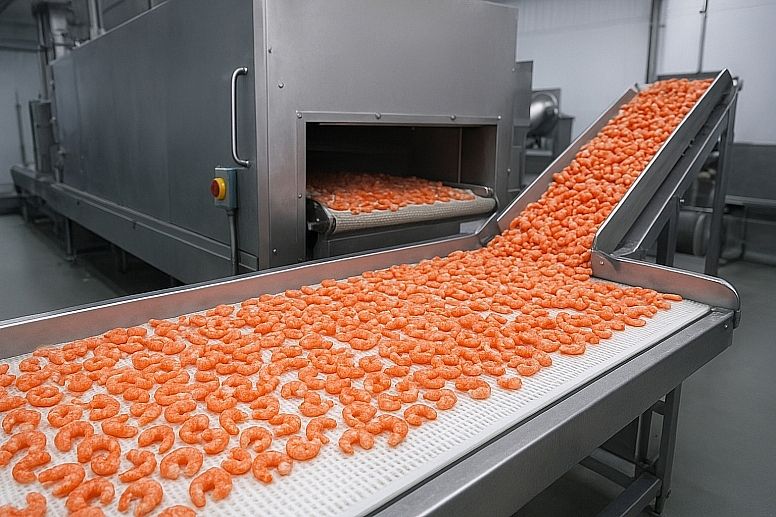
Benefits of Using Industrial IQF Systems in Food Processing
In the rapidly evolving food industry, staying ahead of technological advancements is key to success. Industrial Individual Quick Freezing (IQF) systems represent a significant leap in food preservation technology. These systems allow for the rapid freezing of individual pieces of food, locking in freshness, taste, and nutritional value. Such capabilities are transforming the way food processors approach the challenge of meeting consumer demands for high-quality frozen products.
Below, we'll delve into the various benefits of employing IQF technology in the food processing sector.
Exploring the Advantages of Industrial IQF Technology in Food Preservation
Industrial IQF systems offer a fast and effective way to freeze food while keeping its natural taste, texture, and nutrients intact. By freezing each piece individually, they prevent large ice crystals from forming, which helps maintain freshness, color, and quality better than traditional methods. This process ensures that fruits, vegetables, seafood, and meats closely resemble their fresh state even after freezing.
Beyond quality, the technology also supports food safety by reducing the time products spend before freezing, lowering bacterial growth, and minimizing cross-contamination risks. With the ability to handle a wide variety of foods and adapt to market demands quickly, IQF systems give processors the flexibility and competitive advantage needed in today’s fast-moving food industry.
Enhancing Product Quality with Quick Freeze Capabilities
IQF technology enhances product quality by rapidly freezing food, preventing the formation of large ice crystals that damage cell walls and lead to mushiness. Instead, smaller crystals form, preserving texture and delivering an eating experience similar to fresh produce. Beyond texture, IQF maintains the natural color and shape of foods, boosting visual appeal and marketability in competitive markets.
Its quick-freeze capabilities allow seasonal items to be processed at peak freshness, ensuring high-quality products are available year-round with minimal loss in nutrition. This preservation method also enables food processors to develop innovative blends and mixes without compromising the integrity of individual components.
Boosting Efficiency and Reducing Waste in Food Processing Using IQF
Implementing IQF technology in food processing boosts efficiency by freezing products individually, allowing quick packaging and reducing the need for extensive cold storage. This not only cuts energy costs but also minimizes the physical space required for storage. The process supports precise inventory management, enabling processors to track quantities accurately, improve forecasting, and limit waste from overproduction.
By freezing items separately, processors can pack to order, offering flexibility in product sizes and packaging while reducing excess materials. IQF also accelerates supply chains, allowing products to be processed faster and delivered more efficiently to distributors and retailers, helping maintain product freshness for consumers.
Meeting Consumer Demand for Freshness and Nutritional Value with Industrial IQF

Consumers today place high value on freshness, nutrition, and convenience in their food choices. Individually Quick Frozen (IQF) technology addresses these demands by preserving natural flavors, textures, and nutrients through rapid freezing, minimizing nutrient loss and maintaining enzyme integrity. This allows frozen products to remain as wholesome as fresh options, appealing to health-conscious individuals seeking unprocessed and natural foods.
IQF also supports busy lifestyles by offering quick, easy-to-prepare meals without compromising on quality or health. By extending shelf life without preservatives and ensuring year-round access to out-of-season produce, IQF delivers both variety and reliability, aligning with modern dietary expectations.
The Environmental and Economic Impact of Implementing IQF Systems in the Food Industry
IQF systems provide notable environmental and economic benefits to the food industry. By reducing waste from spoiled food and cutting energy use through efficient freezing, they support sustainable practices while also eliminating the need for additives and preservatives. Economically, IQF extends shelf life and improves product turnover, leading to higher profitability for producers and retailers.
The growing demand for high-quality frozen foods opens opportunities for providers of IQF technology and services. In regions facing food scarcity, IQF helps maintain a reliable food supply, supporting food security and reducing the risk of food deserts. The adoption of this technology also stimulates job creation within the food technology sector.
Much like how innovative materials and modular systems have transformed architectural design, Industrial IQF technology represents a similar evolution in the food industry’s structural processes. By rapidly freezing individual food items, IQF systems preserve the natural integrity of flavor and form—echoing the precision and efficiency architects strive for in sustainable design. This integration of technology and purpose not only enhances product quality but also mirrors architectural values of adaptability, resource efficiency, and long-term resilience. As food processing facilities evolve, IQF technology becomes a key element in designing production environments that are both high-performing and environmentally conscious.
Altogether, the impact of integrating Industrial IQF systems into the food processing landscape is multifaceted, offering improvements in product quality, operational efficiency, and meeting consumer expectations. Companies looking towards the future will find that the implementation of IQF technology is not just a trend but a pivotal investment in the sustainability and profitability of their business.










